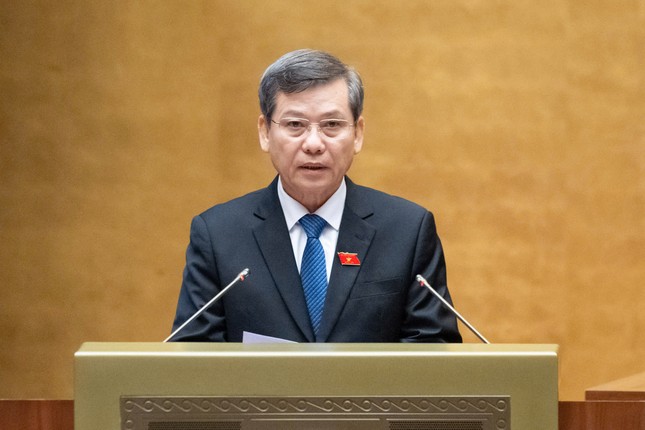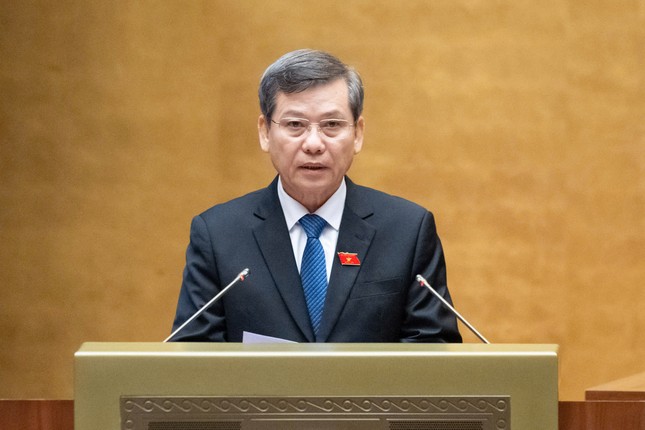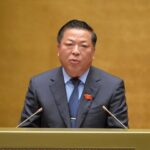The draft Law amending and supplementing a number of articles of the Law on the Organization of the People’s Court was presented to the National Assembly for discussion. During the group discussion session, there was a suggestion to clarify the reason for not specifying that regional courts should handle criminal cases with penalties of over 20 years imprisonment.
In response to this inquiry, the Supreme People’s Court explained that this provision serves as a transitional step, as the capacity of a small number of judges in mountainous, remote, and sparsely populated areas is not yet fully up to par.

Chief Justice of the Supreme People’s Court, Le Minh Tri. Photo: QH
Moving forward, as the capacity of judges at these courts improves and aligns with the standards of other courts nationwide, further research will be conducted to propose an expansion of the jurisdiction of regional courts to handle all criminal cases through first-instance procedures.
Additionally, there was a suggestion from a delegate to include in the draft law a provision stating that “the chief justice of the provincial court shall answer interpellations before the Provincial People’s Council.”
The Supreme People’s Court clarified that currently, the chief justice of the provincial court fulfills the task of answering interpellations as stipulated in the Law on the Activities of Supervision by the National Assembly and the People’s Councils.
The matter raised by the National Assembly delegate pertains to amendments and supplements to the Constitution. “When providing feedback on the draft resolution amending and supplementing a number of articles of the Constitution, the Supreme People’s Court suggested retaining this task for the chief justice of the provincial court,” the explanatory report stated.
Based on the outcomes of the amendments and supplements to the Constitution, the Supreme People’s Court will propose amendments and supplements to this provision in the Law on the Activities of Supervision by the National Assembly and the People’s Councils to ensure consistency with the Constitution, without repeating it in this law to avoid redundancy.
This issue has also been a focus of attention and discussion among many delegates when providing feedback on the amendments and supplements to the 2013 Constitution.
According to the Committee for Draft Amendments to the Constitution, the proposal to exclude the Chief Justice of the People’s Court and the Chief Prosecutor of the People’s Procuracy from the scope of persons subject to interpellations by People’s Council delegates is in line with the nature and organizational model of state agencies at the local level following the reorganization.
While not specifying the authority of People’s Council delegates to interpellate the Chief Justice of the People’s Court and the Chief Prosecutor of the People’s Procuracy, the People’s Councils still exercise their supervisory powers over the observance of the Constitution and laws in their respective localities.
The draft Law amending and supplementing a number of articles of the Law on the Organization of the People’s Court was discussed by the National Assembly on May 19 and is expected to be passed on June 25.
The Highway to Success: Congress Deliberates on Investment Strategies for Two Key Expressways
The National Assembly continued its 9th session on May 19th, with a focus on transportation infrastructure development. The agenda included a presentation and review of the investment proposal for the Quy Nhon-Pleiku highway project and adjustments to the investment plan for the Bien Hoa-Vung Tau (phase 1) expressway.
The Highway to Success: Congress Deliberates on Investment Strategies for Two Key Expressways
The National Assembly continued its 9th session on the morning of May 19th, with a focus on transportation infrastructure development. The agenda included a presentation and review of the investment proposal for the Quy Nhon-Pleiku highway project and adjustments to the investment plan for the Bien Hoa-Vung Tau highway project (phase 1).
Over 1.5 Million Delegates Attend National Conference to Propagate and Implement Resolutions 66 and 68
“On Monday, May 18th, the Political Bureau and the Secretariat held a nationwide conference to promulgate and implement Resolution No. 66-NQ/TW, dated April 30, 2025, issued by the Political Bureau regarding the innovation of legal construction and enforcement to meet the country’s development demands in the new era. Additionally, they also discussed Resolution No. 68-NQ/TW, dated May 4, 2025, which focuses on the development of the private economy.”
“Streamlining the Bidding Process: An Efficient Approach”
Let me know if you would like me to provide any additional revisions or if you have another writing task for me!
“In a recent meeting with the National Assembly, Party General Secretary To Lam addressed the shortcomings of the current bidding process by referring to the project ‘1 law amends 7 laws’ related to investment and bidding. “





![[Photo Essay]: National Conference on the Propagation and Implementation of the 11th Plenum Resolutions](https://xe.today/wp-content/uploads/2025/05/img2050-17447720177111743218177-150x150.jpg)















